Hemorrhoids, also known as piles, are swollen blood vessels that form in the rectum or anus. They are usually caused by increased pressure on the veins of the anus and rectum. This Increased pressure on the anal veins can occur for many reasons but is most commonly the result of constipation, especially straining to pass stools, and pregnancy and childbirth.
They can be divided into 3 categories; Internal hemorrhoids which develop inside the rectum, where they cannot be seen. Because they are usually painless, one may not even be aware of them unless they bleed. The External hemorrhoids are located at the lower end of the anal canal, at the opening of the anus and under the skin. They are likely to become inflamed; and when they do, they turn blue or purple and feel tender to the touch. These hemorrhoids can be quite painful because of the high number of nerves in the anus.
If an internal hemorrhoid becomes enlarged, it may collapse and descend so that it partially protrudes outside of the anus. These lumpy-looking masses of tissue are called Prolapsed hemorrhoids. They usually appear after a bowel movement and produce both mucus and heavy bleeding and can also be excruciatingly painful.
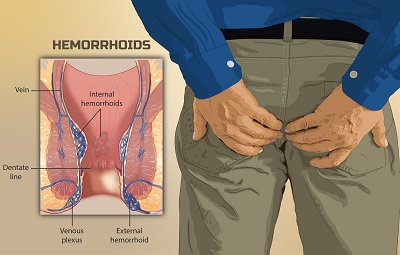
Most cases of hemorrhoids are linked in some way to a lack of dietary fiber. They are best treated with increased fiber intake, detoxification, and soothing treatments for the pain and the itching. More aggressive treatments may be needed if they don’t improve.
Common symptoms include pain. itching, burning, or bleeding in the anal area. Lumpy tissue protruding from the anus may also occur in some cases. Blue or purple patches of hard skin may also be visible near the anus.
Causes of Hemorrhoids Include the following;
- Constipation and straining to pass out stool
- Inactivity, especially standing or sitting for extended periods
- Pregnancy and childbirth
- Obesity
- Lifting heavy objects
- Poor anal hygiene
Treatment
Diet
Almost everyone who suffers from hemorrhoids, even people who aren’t constipated. will benefit from dietary changes.
Recommendations
- The best way to relieve hemorrhoids is to consume more fiber. Eat lots of whole grains, raw or lightly cooked fruits and vegetables, beans, nuts, and seeds.
- Rather than sitting down to eat two or three large meals every day, plan on having several smaller meals instead.
- Drink a glass of clean water every two waking hours (8 glasses in a day) to allow stools to pass more easily.
- Green leafy vegetables are a good source of Vitamin K, which helps to stop or prevent bleeding.
- If you’re pregnant, you have another reason to eat your green leafy vegetables. These vegetables are high in B6, a vitamin that many pregnant women lack; a deficiency of which may contribute to hemorrhoids.
- Foods rich in bioflavonoids have been shown to significantly reduce inflammation and also strengthen capillaries. They include strawberry, apples, grapes, blueberry, onions, spinach, and broccoli.
- Have a tablespoon of flaxseed oil every day to encourage elimination, or sprinkle 1 to 2 tablespoons of ground flaxseeds onto cereal or salads.
- If hemorrhoids result from constipation or straining, go on a three-day juice fast to cleanse accumulated waste matter from your digestive tract. If you are constipated when you begin taking the fast, add psyllium husks or flaxseeds to your juices for fiber.
- A probiotic contains friendly bacteria, such as lactobacillus and bifidobacterium, which improve digestion and constipation. Take a product that contains at least four billion active organisms daily.
- Aloe vera juice is healing and soothing to the entire digestive tract. Drink half a glass daily.
- Vitamin C strengthens the rectal tissue. Take 500 mg two or three times daily.
- Regular exercise such as walking or swimming can improve blood circulation and prevent the development of hemorrhoids.
Foods to Avoid
- Fats and oils slow down the digestive system. Stay away from foods that are fried or otherwise high in saturated fat.
- Caffeine and alcohol are dehydrating and worsen hemorrhoids.
- Avoid sugars and spicy foods, as they tend to worsen this condition.
- Some cases of hemorrhoids are caused by food allergies. The most common ones that lead to hemorrhoids are cow’s milk, wheat, citrus fruit, tomatoes, and peanuts.
Comment below to share your thoughts on this blog post!!
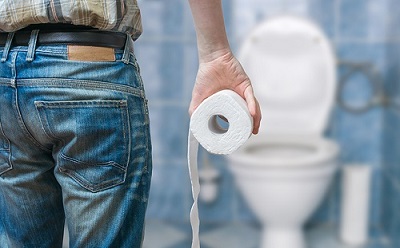
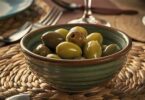
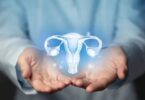


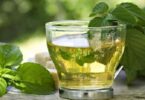
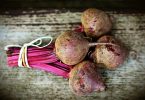
Leave a Comment